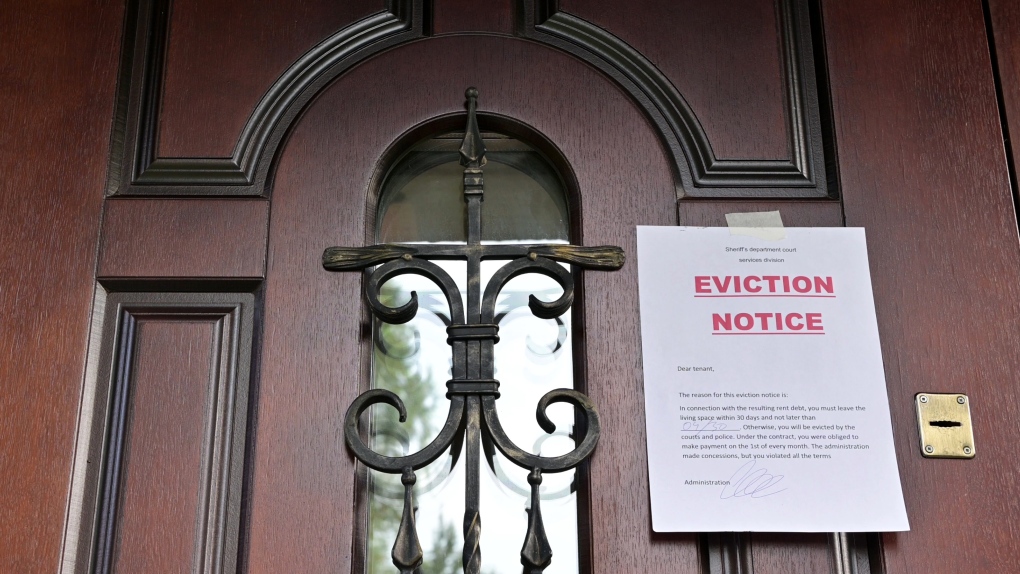Vancouver landlord must pay former tenants $21K for wrongful eviction, court says in upholding RTB ruling
 This stock image shows a door with an eviction notice on it. (Credit: Shutterstock)
This stock image shows a door with an eviction notice on it. (Credit: Shutterstock)
A Vancouver landlord has lost her appeal of a ruling that ordered her to pay former tenants $21,600 as compensation for their wrongful eviction.
The B.C. Supreme Court ruled on the case Thursday, describing the circumstances that led to the eviction and the dispute that followed.
Tejinder Sidhoo, who owns a home with two rental units in the city's West End, notified the renters – who had lived in the suite for about six years – that they were being evicted so her daughter could move in.
"The tenants moved out by April 1, 2020. However, they later learned that the daughter was not living in the rental unit and they believed she had never moved in," Justice F. Matthew Kirchner wrote in the decision, adding that the tenants filed a dispute notice with the Residential Tenancy Branch contesting their eviction.
B.C.'s Residential Tenancy Act allows for evictions in the event that a landlord plans to move a close family member into a unit, provided they give two months’ notice. If a tenant challenges the eviction, the onus is on the landlord to prove that their family member not only moved in but stayed in the suite for six months.
The RTB, in this case, found the landlord had not proven that her daughter lived in the suite for the required six months and awarded the tenants one year's worth of rent. The evidence considered included evidence from the residents of the other unit in the house that no one moved in in April of 2020 and that a "For Rent” sign went up a few months later.
Sidhoo appealed the decision, saying the RTB had failed to admit evidence that would establish an exemption from the requirement to compensate the former tenants based on extenuating circumstances.
The landlord said her daughter's move to Vancouver was delayed by two months due to the COVID-19 pandemic, and that once she did arrive she lost her job and had to move to another city three months later for work. These factors, Sidhoo argued, prevented her daughter from moving in when she was supposed to and staying for the required six months.
Sidhoo said documents showing this were not admitted as evidence in the RTB hearing, but that they should have been.
"The landlord also argues that she was not permitted to lead certain oral testimony and make arguments relating to extenuating circumstances that purportedly explain why the daughter did not occupy the rental unit," Kirchner's decision said.
Essentially, Sidhoo was arguing that because the RTB decision did not address or make a determination on the issue of extenuating circumstances it should be dismissed and a new hearing should be ordered.
The judge was not persuaded.
"I have found the landlord’s affidavit evidence lacking credibility as to what was argued or sought to be argued at the hearing. I am not persuaded that extenuating circumstances were advanced as a serious issue. Consequently, I am not persuaded the Arbitrator’s decision was patently unreasonable for failing to address that issue in the reasons," Kirchner wrote.
"However, even if extenuating circumstances had been asserted as part of the Landlord’s response, I find the result would not have been any different."
CTVNews.ca Top Stories

Heavy snow, freezing rain warnings hit parts of Canada, expected to last throughout Monday
Significant snowfall and heavy rain hit parts of Canada on Sunday and the weather system is expected to continue into Monday morning and throughout the day.
BoC expected to lower interest rates again, with odds leaning toward larger cut
Financial markets and forecasters are betting on another jumbo interest rate cut from the Bank of Canada this week.
The Canada Post strike involving more than 55,000 has hit 25 days
The Canada Post strike involving more than 55,000 workers has hit 25 days.
Most Canadians view illegal immigrant border crossings as concern for U.S.: Nanos survey
More than 80 per cent of Canadians believe the flow of illegal immigrants from Canada to the U.S. is a concern, according to a new survey.
Government faces third Tory non-confidence vote ahead of potential fiscal hurdle
The Liberals are set to face a third Conservative non-confidence vote today, but the government is likely to survive with the support of the NDP.
Jay-Z denies allegations he sexually assaulted a 13-year-old in 2000 with Sean 'Diddy' Combs
A woman who alleges she was sexually assaulted by Sean 'Diddy' Combs has amended her lawsuit to include allegations that she was also assaulted by Jay-Z at the same party.
Taylor Swift ends record-smashing Eras Tour in Vancouver, after glittering global run
Taylor Swift took the stage for the final time on her record-smashing Eras Tour, watched by tens of thousands of delirious fans in Vancouver's BC Place arena and by millions on livestreams around the world.
Celebrities spotted at Taylor Swift's final Eras Tour performance in Vancouver
Taylor Swift fans from around the world gathered in Vancouver on Sunday to witness the final performance of her massively popular Eras Tour, including a few celebrities.
Syrian prime minister says government is still functioning but foreign and domestic challenges loom
Syria's prime minister said Monday that most cabinet ministers are still working from offices in Damascus after rebels entered the capital over the weekend and overthrew President Bashar Assad. Streams of refugees crossed in from neighboring countries, hoping for a more peaceful future.






























